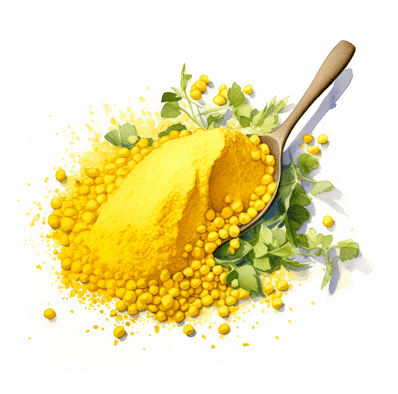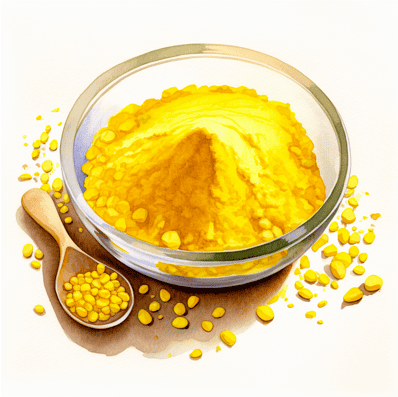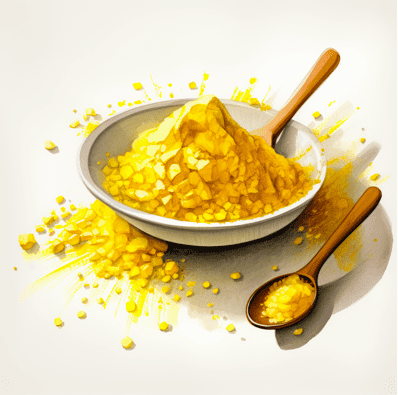
Does Pea Protein Cause Acne?
Pea protein and other plant-based proteins are generally not linked to acne, unlike some animal proteins like whey. Balance your diet, opt for unsweetened protein powders, and pay attention to overall skin health practices. Different proteins affect everyone uniquely, so observe closely how your skin responds!
ABOUT ME
Be beauty. Be plant-based!
As a former Registered Nurse and avid plant-muncher, I’m in love with how simple plant-based foods make it easy to be beautiful.

You might also like:
Does Detoxing Cause Acne? From Acne Woe to Glow
Friend or Foe: Does Ghee Cause Acne?
Let’s face it, our quest to stay fit and fabulous is no less than a roller-coaster ride, right? One day we’re sipping on kale smoothies, and the next day we’re questioning if our protein powder is plotting against our skin. Pea protein powder, a beloved component of our plant-based kingdom, has recently found itself in the midst of a debate – is it a friend or foe for our skin? Does pea protein cause acne?
Take a front-row seat to this skincare drama below, and see if you decide if pea protein is indeed the culprit behind those unwelcome acne breakouts. I understand the ongoing struggle to balance a busy schedule, health, and beauty – it’s not just about looking good, it’s about feeling good, too. But hey, we’re in this together!
What’s Great About Pea Protein Powder
Pea protein powder has long enjoyed a royal status among vegan protein powders. Derived from the humble yellow split pea, it’s a nutrient-packed superstar that offers a fantastic plant-based alternative for those of us who aren’t exactly fans of dairy products.

And why not? It’s loaded with all the essential amino acids (minus the bloating effects of whey protein), making it the crowned jewel in the kingdom of plant-based proteins.
But amidst its growing popularity, some of us have started to raise an eyebrow – is pea protein powder the stealthy foe behind our acne breakouts? In our pursuit of health and fitness, are we inadvertently triggering skin issues?
After all, no amount of pea protein’s nutritional benefits would be worth those pesky, confidence-diminishing pimples, right? Hold your green smoothies, ladies; it’s time to investigate.
Spotlight on Acne
Acne – it’s like that uninvited party guest who loves crashing your skincare party. Usually starting with the onset of puberty and sometimes sticking around well into adulthood, acne is a real a party pooper.
But what triggers these breakouts? Acne results from blocked hair follicles that lead to the build-up of oil and dead skin cells, creating a perfect breeding ground for acne-causing bacteria.
Now, let’s bring protein shakes into the picture. Certain proteins, especially whey protein powder, have been speculated to play a role in acne. Why? Whey protein can stimulate the production of an insulin-like growth factor (IGF-1). IGF-1 is like the evil wizard that can increase oil production and trigger acne breakouts.
Now, we know you might be wondering if plant-based proteins like pea protein can have the same effect. Let’s explore this in the next section.
Pea Protein and Acne: Unravelling the Connection
As we delve into the pea protein and acne mystery, we’ll first need to understand how pea protein impacts our bodies. Pea protein, much like other proteins, aids in muscle growth and supports our immune system. But the real question here is whether it plays a role in the production of sebum, the oily substance that’s often the culprit behind acne.

Comparing plant-based proteins and whey protein supplements when it comes to acne, we start seeing some differences. While whey protein (derived from milk) might be the troublesome teen causing spikes in IGF-1 and subsequently increased sebum production, pea protein powder doesn’t seem to stir up the same kind of trouble.
The secret lies in the essential amino acids in pea protein powder. While it provides a complete protein profile (i.e., all the essential amino acids we need), it doesn’t seem to promote IGF-1 levels like its dairy counterpart.
While research still needs to be conducted for a definitive answer, pea protein may not be the villain in our acne story after all. However, let’s not jump to conclusions just yet. The tale of the pea protein and acne relationship unfolds further in the next section.
Is Pea Protein Innocent or Guilty?
We’ve reached the climax of our pea protein and acne mystery. I have looked for studies and scientific data, and there are none. So I pea protein is not a known trigger for acne. Phew, we can hear your sigh of relief, and trust me, I’m right there with you!
In simple terms, your pea protein smoothie isn’t the bad guy in your skincare saga.

However, it’s essential to remember that everyone’s skin reacts differently. Just because pea protein isn’t a known acne trigger doesn’t mean it can’t cause breakouts in some people, particularly if they have a sensitivity or allergy to peas.
Other Protein Players
So, with pea protein now cleared of the main charges, let’s consider other protein alternatives. We’re talking about other plant proteins like brown rice protein and hemp protein. How do they stack up in our acne investigation?
These protein powders are also popular choices in the plant-based world. Brown rice protein is rich in essential amino acids and is hypoallergenic, making it a friendly choice for those with sensitive skin. On the other hand, hemp protein, a complete protein, comes with the added benefit of omega-3 and omega-6 fatty acids, promoting skin health.
Like pea protein, these plant proteins haven’t been associated with acne the way dairy-based proteins like whey have. So if you’re looking for the best protein powder for skin health, you might want to consider these plant-based proteins as potential contenders.
But remember, while we’ve got some promising leads here, everyone’s skin is unique, and what works for one may not work for all.
The key is to listen to your skin and your body (and your tastebuds!), making adjustments as necessary. Your journey to health and beauty is personal, and what matters most is what makes you feel best, both inside and out.
Incorporating Pea Protein Powder in Your Diet
Okay, our plant-based goddess, now that we’ve cracked the acne mystery and acquitted pea protein of its supposed skincare crimes, it’s time to talk about incorporating this protein powerhouse into your diet.

First off, pea protein powder can be a fantastic addition to your morning smoothie, adding not just protein but also a creamy texture that makes it feel like a decadent treat.
You might like: High Protein Super Green Smoothie by The Plant Powered Dietician
But remember, while pea protein is a winner in our books, it’s crucial to keep an eye on artificial sweeteners that might be lurking in your protein powder. These sweet little devils can mess with your gut health, leading to inflammation that could manifest as skin issues.
So, choose unsweetened protein powders or those sweetened with natural alternatives like stevia.
We also love the idea of adding pea protein powder into your oatmeal, pancakes, or even your homemade energy bars. The world is your plant-based oyster, and we can’t wait to see the delicious ways you’ll include pea protein in your meals.
Acne Management
Despite our findings, we must remember that everyone’s skin is different, and the triggers for acne can vary widely from person to person. It’s crucial to maintain a balanced diet and consume proteins, including pea protein, in moderation. Overdoing anything, even the good stuff, can lead to imbalance in the body and may reflect on your skin.
For managing existing acne, a skincare routine that includes acne-fighting ingredients like benzoyl peroxide can be beneficial. It helps reduce the acne-causing bacteria and removes excess oils and dead skin cells.
Additionally, remember to stay hydrated, eat as much plant-based food as you can, and ensure you’re getting enough sleep. These lifestyle factors play a significant role in our skin health and can help manage acne breakouts.
In the end, your health and beauty journey is your own. It’s about finding what works for you and what makes you feel good about yourself. Don’t be afraid to experiment, adjust, and most importantly, enjoy the process!
Your radiant, glowing skin is a reflection of your inner health and happiness, and it’s worth every bit of love and care you put into it.
FAQ: Does Pea Protein Cause Acne?
Can plant protein powder cause acne?
Plant-based protein powders, including pea protein, have not been directly linked to causing acne according to current scientific evidence. They can be a great option for those with acne-prone skin, especially compared to certain animal-based proteins like whey, which have been shown to stimulate the sebaceous glands due to the production of a hormone known as IGF-1.
Is protein good for your skin?
Yes, protein is essential for maintaining healthy skin as it aids in repair and the regeneration of skin cells. It can also help maintain muscle mass, which indirectly contributes to your overall well-being and skin health.
What are the negatives of pea protein?
While pea protein is generally safe, some people might experience side effects like bloating or gas. Also, like any protein supplement, it should not be the sole source of your dietary protein intake.
Which protein does not cause acne?
Based on current scientific evidence, most plant-based proteins, including pea and hemp, do not cause acne. They can be the best option for people on a vegan diet or those with acne-prone skin.
Do protein shakes cause pimples?
The potential for protein shakes to cause pimples seems to be mostly linked to whey protein and not plant-based proteins. Whey protein, derived from cow’s milk, may influence hormone levels, leading to increased oil production and the development of acne.
How do you prevent pimples on a high protein diet?
A high protein diet may not necessarily cause acne unless it’s heavy on dairy and skim milk products. Opting for plant-based proteins can be a wise move. Also, ensuring that you balance your diet with plenty of fruits, vegetables, and whole grains can help maintain overall health and skin wellness.
What foods trigger hormonal acne?
Foods that have a high glycemic index, like sugary drinks, white bread, and chips, can trigger hormonal changes that may lead to skin inflammation and acne. Similarly, dairy products, particularly skim milk, have been associated with the development of hormonal acne.
What are acne-friendly protein sources?
Plant-based proteins, such as pea, hemp, and brown rice proteins, are generally acne-friendly. They are less likely to affect hormone levels and oil production compared to some animal proteins, making them a safe choice for acne-prone skin.
How do you calm hormonal acne?
Hormonal acne can be soothed by maintaining a balanced diet, reducing stress, and incorporating regular exercise. Also, certain topical treatments, oral medications, and lifestyle changes can help manage hormonal acne. Always consult with a dermatologist for personalised advice.
How is plant protein or vegan protein different from animal protein?
Plant proteins are derived from a variety of grains, legumes, and seeds and often come with the added benefit of fibre and minimal saturated fats. Animal proteins, which include milk proteins, are often complete proteins and contain all essential amino acids. However, some types of animal proteins like whey and casein (main proteins in cow’s milk) have been linked to acne, which is not generally the case with plant proteins.
What is the best plant-based protein for a vegan diet?
The best plant-based protein varies depending on individual dietary needs and preferences. However, pea, brown rice, and hemp protein are all great options as they are rich in essential amino acids.
Can a high protein diet cause acne?
While there is a possible link between a high protein diet rich in dairy products and acne, there is no conclusive evidence that a high protein diet alone will cause acne. The key is to ensure a balanced diet and, if you’re acne-prone, opt for plant-based protein powder supplements over animal-based ones.
Are protein powder supplements necessary for getting enough protein?
While protein powder supplements can be a convenient way to ensure you’re getting enough protein, they are not necessary if you’re consuming a balanced diet. Whole foods should be your primary source of nutrients, including protein.
What is the best type of protein for skin health?
There is no definitive ‘best’ type of protein for skin health as this depends on individual needs and responses. However, plant-based proteins are generally a safe choice as they are less likely to stimulate oil production and cause acne compared to some animal proteins. Always listen to your body and observe how it reacts to different types of proteins.
Can white protein cause acne?
White protein typically refers to egg whites, and just like with other proteins, reactions can vary widely from person to person. For some, they might experience acne breakouts, but for many others, it poses no problem. Always observe how your body and skin respond to any new dietary changes.
What role do milk products and casein proteins play in acne production?
Dairy products, including those with casein proteins, have been linked to acne due to their potential to stimulate the production of insulin-like growth factor-1 (IGF-1) and other hormones that can lead to increased oil production and clogged pores.
What are the different types of protein powders available in the market?
There are several types of protein powders available. Some popular ones include whey, casein, egg, pea, hemp, and brown rice. Each of these protein powders has its unique nutritional profile and potential benefits.
Can overconsumption of vegan proteins cause acne?
Overconsumption of anything can potentially lead to imbalances in the body. While vegan proteins are generally not directly linked to acne, if you have a sensitivity or allergy to a particular plant protein, it may cause a reaction. Always listen to your body and observe how your skin responds.
Are there any side effects of pea protein powder?
Pea protein is generally safe for most people. However, like with any food, some people may have allergies or intolerances. Common side effects could include bloating, gas, or feeling full. If you notice any adverse reactions, it’s best to stop usage and consult a healthcare professional.
Can protein powders replace natural food sources?
While protein powders are a convenient way to increase your protein intake, they should not replace whole foods entirely. Whole foods provide a wide variety of other essential nutrients and should form the basis of your diet.
Conclusion
Our journey investigating the connection between pea protein and acne has been an enlightening one. It appears that for most of us, pea protein can indeed continue to be our cherished ally on our health and beauty journey. However, keep in mind that everyone is unique, and what works wonders for one person might not have the same effect on another.
Remember, your journey to health and beauty isn’t about following a rigid set of rules but finding what works best for your body. Listen to your body, be gentle with yourself, and most importantly, enjoy the process. You’re a plant-based goddess, after all, and your glow comes as much from your radiant health as it does from your beautiful spirit. Here’s to a healthier, happier, and more confident you!